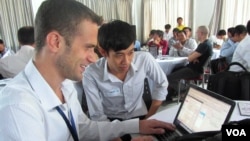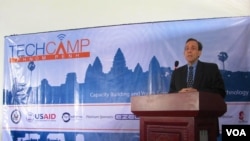PHNOM PENH —
As more and more young Cambodians log on and use social media, technology is becoming an important source of change in the country, experts say.
Cambodia has seen an explosion in the use of online and mobile technology, particularly social media platforms like Facebook. Participants of a recent technology workshop in Phnom Penh say this has made them more informed than ever.
Tin Savetey, a university student, says she has become better informed online.
“I can know information from around the world and learn about what is happening and in which country, via social media,” she said.
Technology experts say social media is helping a lot of Cambodians like Tin Savetey share information with the public. Especially young people.
Keo Oudom, an information technology trainer and Internet entrepreneur, said social media, used properly, can help the country develop. “For example, when we share useful information for students, as well as the general public, to have longterm vision and think about the nation and themselves,” he said.
But social media has also become a place where a new kind of citizen journalist posts video online. YouTube and Facebook have recently seen an uptick in the number of posts depicting anti-government protests, or of police violence, gaining attention and public criticism.
Chan Sok Khieng, the rector of Norton University in Phnom Penh, said social media has made it possible for young people to air their grievances.
“Previously, when social media was not available, our youth did not know where they could speak out,” he said. “But now these media enable them to express their opinions on some vital, sensitive issues in society.”
And social media creates an amplifier.
“In society today, one person can reach thousands of thousands of people, so the more connected you are, the more people you can engage with and the more people you can get the word out to,” US Ambassador William Todd said.
This has implications for Cambodia’s human rights climate.
The more people who are online, the more they can change, said Lach Vannak, who coordinates an online project called Sithi for the Cambodian Center for Human Rights.
“When they get the information, they know they have rights and a responsibility to take action for their society,” he said.
Online social media also means a way around traditional media, said Javier Sola, program director for Open Institute. People can access more information more quickly. That means whether or not “news” is shown on television, people will know about it regardless, he said.
But despite the excitement of its advocates, social media does not have everyone convinced. Especially because the vast majority of Cambodians are not yet online.
“The number of Facebook users accounts for just 5 percent of the population,” said Phin Santel, a blogger for KhmerBird. “So the voice is small.”
Cambodia has seen an explosion in the use of online and mobile technology, particularly social media platforms like Facebook. Participants of a recent technology workshop in Phnom Penh say this has made them more informed than ever.
Tin Savetey, a university student, says she has become better informed online.
“I can know information from around the world and learn about what is happening and in which country, via social media,” she said.
Technology experts say social media is helping a lot of Cambodians like Tin Savetey share information with the public. Especially young people.
Keo Oudom, an information technology trainer and Internet entrepreneur, said social media, used properly, can help the country develop. “For example, when we share useful information for students, as well as the general public, to have longterm vision and think about the nation and themselves,” he said.
But social media has also become a place where a new kind of citizen journalist posts video online. YouTube and Facebook have recently seen an uptick in the number of posts depicting anti-government protests, or of police violence, gaining attention and public criticism.
Chan Sok Khieng, the rector of Norton University in Phnom Penh, said social media has made it possible for young people to air their grievances.
“Previously, when social media was not available, our youth did not know where they could speak out,” he said. “But now these media enable them to express their opinions on some vital, sensitive issues in society.”
And social media creates an amplifier.
“In society today, one person can reach thousands of thousands of people, so the more connected you are, the more people you can engage with and the more people you can get the word out to,” US Ambassador William Todd said.
This has implications for Cambodia’s human rights climate.
The more people who are online, the more they can change, said Lach Vannak, who coordinates an online project called Sithi for the Cambodian Center for Human Rights.
“When they get the information, they know they have rights and a responsibility to take action for their society,” he said.
Online social media also means a way around traditional media, said Javier Sola, program director for Open Institute. People can access more information more quickly. That means whether or not “news” is shown on television, people will know about it regardless, he said.
But despite the excitement of its advocates, social media does not have everyone convinced. Especially because the vast majority of Cambodians are not yet online.
“The number of Facebook users accounts for just 5 percent of the population,” said Phin Santel, a blogger for KhmerBird. “So the voice is small.”










